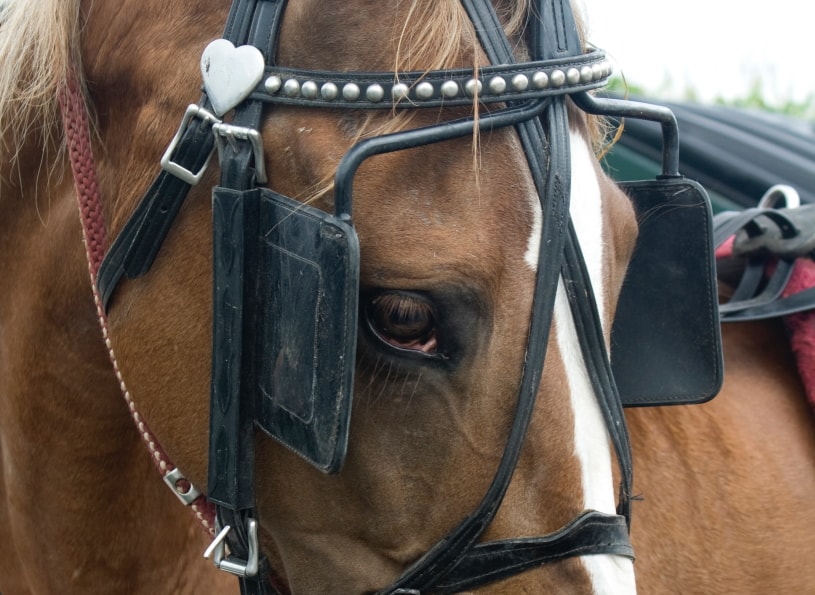Workhorses often wear blinders, small shields positioned near the eye to eliminate peripheral vision. Blinders are a prescribed blindness limiting the horse to only see straight ahead, which in turn makes it more productive and efficient in carrying out its duties.
Every leader knows how important it is to eliminate distractions. Visionary leaders cut through the clutter and concentrate on what matters most. However, focusing too intently on one thing can blind a leader to important opportunities emerging, critical problems surfacing, or key relationships faltering. Failing to notice when key relationships are faltering at work and home is the most deadly blindness. The best leaders have the ability to focus intently on the task at hand while continually noticing key relationships.
[bctt tweet=”Focusing too intently on one thing can blind a leader to important opportunities emerging, critical problems surfacing, or key relationships faltering” username=”BrettPowellorg”]
In the 1970’s Psychologist Ulric Neisser illustrated the power of noticing in a short video clip. A similar clip can be found here. The short clip, only 70 seconds, has a small group of friends passing a basketball back and forth. Half of the small group was wearing white t-shirts and the other half of the group wore black t-shirts. As you watch the clip, you are asked to count the number of passes made by the people wearing black shirts. Most people that watch the video are able to count the passes accurately. But when you ask the viewers if they noticed anything strange in the video, most say, “no” or look confused by your question.
When you watch the video again, and you are asked to not watch the passing basketball but to observe anything peculiar, it comes into plain sight. As the players pass the ball around, a woman dressed in black and holding an umbrella walks through the scene. Some are amazed that they didn’t see it at all when they previously viewed the video. Most viewers are too focused on counting passes.
When we focus too much on one task or one thing, like counting passes, we become blind to other things and people. And those other things and those people might be more important than the task at hand. This is called unintentional blindness.
The good news is that it is possible to overcome unintentional blindness. We must learn to notice.

The power of noticing means being able to see the woman with the umbrella. It means being able to focus on something without going blind to everything else. Noticing can prevent you from making careless mistakes and enable you to become a more present and engaged leader.
[bctt tweet=”Noticing can prevent you from making careless mistakes and enable you to become a more present and engaged leader.” username=”BrettPowellorg”]
Here are a few ways to increase noticing in relationships:
Ask the Second Question. Always follow up, “How are you doing?” with a second, open question, “How was the weekend with your family?” Or, “What is big in your week?” The second question usually opens a more meaningful conversation, allowing you to notice even more!
[bctt tweet=”Always follow up, how are you doing, with a second question. The second question usually opens a more meaningful conversation, allowing you to notice even more!” username=”BrettPowellorg”]
Write down important dates that come up in casual conversation. It is amazing how often people drop hints about important matters in their personal life – wedding anniversaries, doctor appointments, kids’ graduation days, death anniversaries, sports events, and many more. Noticing their importance to the person you are speaking to, then writing them into your calendar and following-up, is a powerful way to demonstrate your willingness and ability to notice as a leader.
Pay attention to what is not being said. Few people are hard of hearing but many are hard of listening. Hearing and listening are not the same thing. Hearing happens when auditory sensations are received by the ears and transmitted to the brain. Listening is a complex process that involves intention and attention to accurately interpret the significance of what is heard. Hearing is a passive process, listening is an active process. If the organs are functioning properly, you can hear without much effort.
Listening requires attention, effort and focus. It helps to have authentic curiosity fueling our desire to know others well. “The heart of another is a rich forest to be explored.” (
Social scientists tell us that over the course of our lifetime, we come across four good listeners. Yep, that’s it, four good listeners. What makes someone a good listener? Empathy – the ability to accurately understand and interpret the feelings of another person. Body language is the way emotion is communicated. Until we hear and feel what another person is saying, we won’t truly understand them. Empathetic listening is a whole-person approach to listening. It means listening with your ears and your heart.

